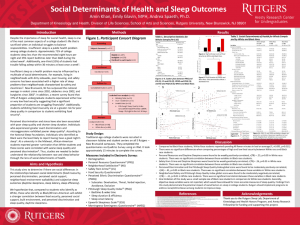Khan, Amin: Social Determinants of Health and Sleep Outcomes
Title: Social Determinants of Health and Sleep Outcomes
Name: Amin Khan
Major: Exercise Science
School affiliation: School of Arts and Sciences
Programs: Aresty – Research or Conference Funding Recipient
Other contributors: Emily Glavin, Andrea Spaeth
Abstract: Despite the importance of sleep health, problems with sleep are common in college students with the majority of students sleeping less than the recommended 8h/night. Individuals who identify as Black are more likely to report insufficient sleep and poor sleep compared to White individuals. The aim of the current study is to understand the relationship between race and sleep behavior through the lens of social determinants of health. It is hypothesized that compared to students who identify as White/Caucasian race, those who identify as Black/African-American race would exhibit a stronger correlation between food security, perceived social support, built environment, and perceived discrimination and sleep quality and daytime sleepiness. An anonymous 15-minute Qualtrics survey was administered in-person to N=116 Rutgers undergraduate students (n=36 Black, n=86 White).The survey included questionnaires to assess social determinants including the Personal Resource Questionnaire, Neighborhood Satisfaction Survey, Safety from Crime Survey, Food Security Questionnaire, Perceived Ethnic Discrimination Questionnaire, were assessed using the validated Pittsburgh Sleep Quality Index, Epworth Sleepiness Scale, and the Morning-Eveningness Questionnaire. Separate between-subject ANOVAs and bi-variate correlations were conducted. Our results show, White race students spent on average 48 fewer minutes in bed than Black race students. Correlation analyses yielded significant weak-to-moderate correlations between social determinants of health and sleep outcomes and the associations were race-specific. Among White race students, more social support and greater feelings of safety from crime were associated with less daytime sleepiness and greater neighborhood satisfaction was associated with better sleep quality. Among Black race students, greater feelings of perceived discrimination was associated with poorer sleep quality. Limitations of this study include a small sample size of Black race students and not using objective sleep variables. Findings from this study demonstrate the potential impact of social factors on sleep in college students. Rutgers should implement programs to address racial/ethnic biases among students to improve sleep.
